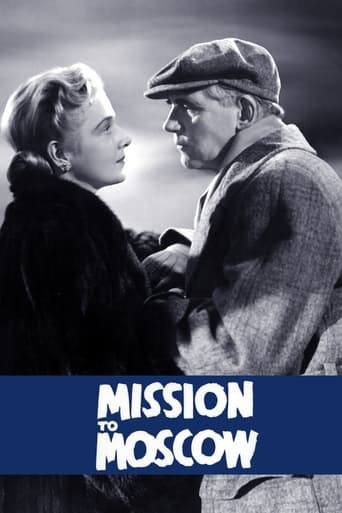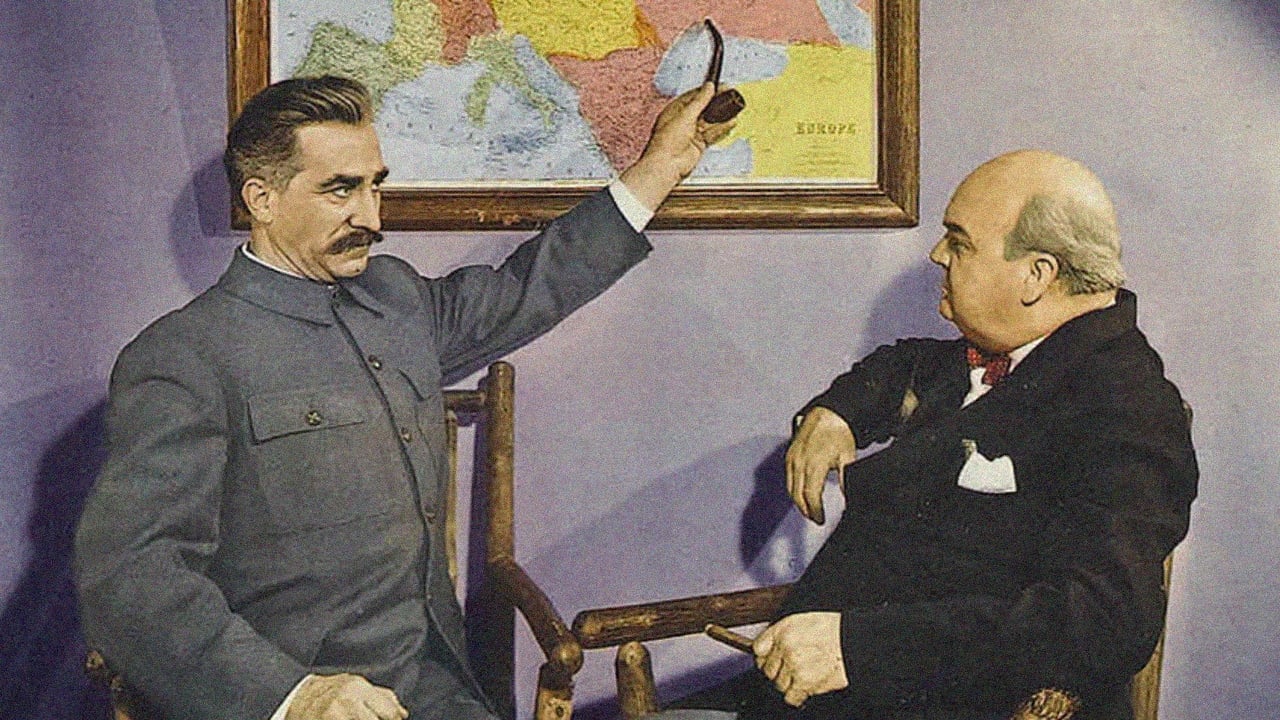SimonJack
What nation in history conducted a propaganda campaign to glorify another nation that it would then spend hundreds of billions of dollars to defend itself against? Or that would spend more than $5 trillion in a nuclear arms race? To those reading this review, the answer is obvious. The U.S. is the only country ever to produce so much propaganda in support of another nation that would soon oppose it. And, that's one of the unique things about this film. "Mission to Moscow" was the first of several Hollywood films to portray Soviet Russia as our good neighbor. The second thing about the film is that it was a sham.This isn't to knock propaganda, which has been used forever. For a good discussion of propaganda and its use, see the review by jacksflicks from Hollywood on April 6, 2004. The performances and film qualities of this movie are okay, but nothing special. It has a cast of prominent actors, as do most of the films that followed. But, why was a major propaganda effort launched then? Warner Brothers made this film at the behest of Pres. Franklin D. Roosevelt. He wanted a movie made from the book by his former ambassador, Walter Davies. That book glamorized the Soviet Union in 1938. But it was a lie, and FDR knew it. Davies supervised the script and everything about the film. The War Department then prevailed on other Hollywood studios to make pro- Soviet movies. After "Mission to Moscow" came out on April 28, 1943, a string of films followed. Columbia released "The Boy from Stalingrad" on May 20 of that year. Samuel Goldwyn and RKO Pictures put out "The North Star" on Nov. 4. The U.S. War Department made a full-length documentary on Nov. 11 that was filmed by a U.S. Army unit in Russia. Three more full-length Hollywood films followed in 1944: "Three Russian Girls" by United Artists on Jan. 14, "Song of Russia" by MGM on February 10, and "Days of Glory" by RKO on June 16, 1944.Most of these films are just fair. But they are unlike any of the other war films being made about resistance fighters and underground forces in other countries. These clearly are propaganda films. But why were they being made by the U.S. to promote another country way into the war? We no longer needed to build American support for Russia, or to urge the Soviets to enter the war on our side. We already had both.Russia was in the war since Germany invaded it on June 22, 1941. It now made the second front that the Allies wanted. England had been sending armaments and supplies to Russia. And, the Russians had stalled the Germans since Aug. 23, 1942, and then defeated them in the Battle of Stalingrad on Feb. 2, 1943. The Allies were winning elsewhere. Germany had lost the Battle of Britain in 1940, and it was fast losing the air war everywhere. The Allies had been bombing Berlin since 1940. They defeated the Germans at the Second Battle of El Alamein on Nov. 11, 1942, and German surrender in Africa would come on May 13, 1943. That was just nine days before this film was released. So, there clearly was no need for a new propaganda push by the U.S. in support of Soviet Russia. Unless there were other reasons FDR wanted Americans to have friendly feelings toward the Soviets? Because, once Germany was defeated, public concern would then turn its gaze on communism. So, if Americans would not be wary of Russia, there probably wouldn't be much concern about Europe after the war. Germany, of course, being the exception. Well, that's how it turned out. Winston Churchill coined the phrase "Iron Curtain" for the Soviet domination of Eastern Europe. That was in a speech he gave on March 5, 1946, at Westminster College in Fulton, Missouri. Churchill had been a strong advocate for the freedom of eastern Europe after the war, especially Poland. Some 200,000 Polish soldiers were serving under the British Army. The Yalta Conference of February 4-11, 1945, was to determine the fate of Europe after the war. It was supposed to give self-determination to the people liberated from Nazi Europe. FDR, Churchill and Stalin all agreed to this.But FDR granted concessions to the Soviets, and Churchill went along. Stalin put in place communist governments in all of Eastern Europe. Poland, Czechoslovakia, Hungary, Yugoslavia, the Baltic States and others would now be part of the Soviet Union, along with East Germany. Stalin hoodwinked the Allies and they didn't lift a finger to stop him. The Allies gave the shaft to the people of Eastern Europe. Was Gen. George Patton right after all – about the Soviets?Many in England saw this as a betrayal of Poland. It likely contributed to Churchill's election loss at war's end. At the Potsdam Conference in July, the Soviets denied that they were interfering in the affairs of Romania, Bulgaria and Hungary. And that was that. Back in the U.S., little care was paid to the fate of the Eastern Europeans. After all, everyone knew how good, decent and trustworthy the Soviets were. We had seen it in all these films and our government, Hollywood and the news media wouldn't lie to us, would they?Just think! If all those countries freely had been able to set up their own governments, the Soviet Union would have been much less powerful. It would have many more countries to face. Maybe there wouldn't have been a Cold War at all. Maybe not a nuclear arms race. Would the world have been better if America's leaders, Hollywood and the news media had supported the truth instead of lies? Many thousands of murdered Eastern Europeans and millions who were oppressed for half a century would probably think so.
postenjc-18566
I had heard about this film and recall seeing some scenes previously in some documentary on negative propaganda some time ago. It popped up on TCM. so I thought I'd watch it to see what the fuss was about, after all, one of my favorite actors, Walter Huston, "starred" in the film.After viewing Mission to Moscow and seeing what an example of a really bad film is, I have several questions. Was this actually shown in theaters? If so, did the audience pay to see it, or were they perhaps plucked off the streets and herded into the theater, and the doors locked, so they were compelled to see this awful film.How did they get the actors and crew to work on this "work of art". Blackmail? Why did Walter Huston, an great actor of enormous stature appear? Who knows? To sum up, after seeing this homage and paean to one of the most brutal dictators and awful political systems that was a cancer on human kind and unfortunately was around much longer that Hitler and his Nazis, I'm hard pressed to find that much difference between these two mass murder experts of the 20th century. I just wonder what should have been produced next for the screen after this sickening display, a musical tribute to warts, perhaps?I clicked on my name and this reference popped up. I had completely forgotten that I had reviewed this 40s Fantasy, so I read my thoughts as well as other movie goers reviews of this waste of film stock. After wasting my time, I decided that if I was able to edit my original words, I would like to add this: It would only be fair if Mel Brooks could take his characters of Hustler Max and Nebbish Leo Bloom from Brooks's masterpiece "The Producers" stage another play/musical like Springtime for Hitler" about another mass murderer and all round nice guy Joseph Stalin, perhaps naming this work of art "Sing a Song of Stalin, A Pocket Full of Purges".
predictorcorector
I have read the reviews and can understand why so many dismiss this movie as propaganda.Once a person has an established world-view everything that goes against it is met with rejection,regardless of the actual facts. Most people think Stalin was a bloody dictator,not very smart,paranoid,wanted to dominate the world and generally spent most of his days thinking how can he kill more of his own people.That is how I used to think for over 20 years, until I looked at the actual evidence. I invite all of you to do the same.Have a look at the article called: Lies concerning the history of the Soviet Union and book called Moscow 1937.This should be enough for many people to at least give this another thought. There are also works of the man himself (a collection of 17 books written by Joseph Stalin) which were translated into English by the Chinese.There is a lot more information available in Russian and that is the main reason people there consider Stalin to be the greatest leader of all times.
drystyx
To its credit, we know before viewing that this will indeed be a fairly stuffy, slow moving propaganda film about World War II.The American ambassador visits several countries before the outbreak of the second world war, with Russia his chief focus.The evils of Stalin are downplayed, to say the least, and his brief appearance can either be seen as benevolent or Machiavellian. The evils of Hitler are not downplayed.A film about ambassadors won't be interesting, and will be very stuffy. The director tries to modify this. In effect, we get half-documentary half-movie.This is an important film, because it tells us what people felt during this time, particularly people in power. It gives a very realistic account of the upper society, in an age when the oceans still isolate America, but the safety gap of the oceans was shrinking, as is stated by one of the characters.


 AD
AD


